Our latest research indicates that work from home salaries are higher than in-person pay compared to a sector’s average. The data, collated and analysed by checkasalary.co.uk, compares salaries from a sample size of 1.97 million jobs over the last 12 months.
Key statistics and findings:
-
UK wide, jobs that can be done remotely pay above the national average
-
London has the greatest difference between office vs remote work; East Midlands has the least (63% vs 25%)
-
The average remote job pays approx. £12,000 a year more than an average in-person role
-
The North East of England has the lowest average salary
-
London has the highest average salary
The data is the clearest indicator yet that remote workers in any given sector receive higher pay than in-person workers in the same industry. This may be in part to the expectation for senior and management level executives to combine a greater proportion of remote working in their role, as a matter of course. Hence, many ‘management’ roles are remote, while many ‘worker’ roles are in-person.
While the number of remote employees is on the rise, with the pandemic forcing employers to adopt working remotely wherever possible, many remote workers have or are transitioning back to the office. At a time when cost of living expenses are on a steep rise, and fuel prices are at record levels, in-person workers are set to feel the costs of commuting, both in monetary terms and in time. According to the Office for National Statistics, the average commute was 18.3 minutes in 2019 (women 16.2, men 20.3).
In response to the findings, Jonathan Rawlins, Head of Data at checkasalary.co.uk, says, “The data clearly shows that remote work is being provided to more senior staff members within a given sector. This is particularly troubling given the cost of living challenges the UK is currently experiencing, with the impact being felt greatest by lower-paid workers.”
He says, “Each business has their own business case as to whether remote work works for them. It would be great to see employees have the opportunity to offset tax against commuting costs, much the same as the allowance they get for working from home.”
Daniel Aldridge, a Recruiter with 25 years of experience working globally for Space Recruitment, says, “Having worked in recruitment for over 25 years, placing senior staff, the changes we have seen in the last two years are significant. There is an expectation from candidates that there will be an element of remote work, whether partial or full. It is much harder to find staff for in-person roles.”
UK wide differences in remote vs in-person pay
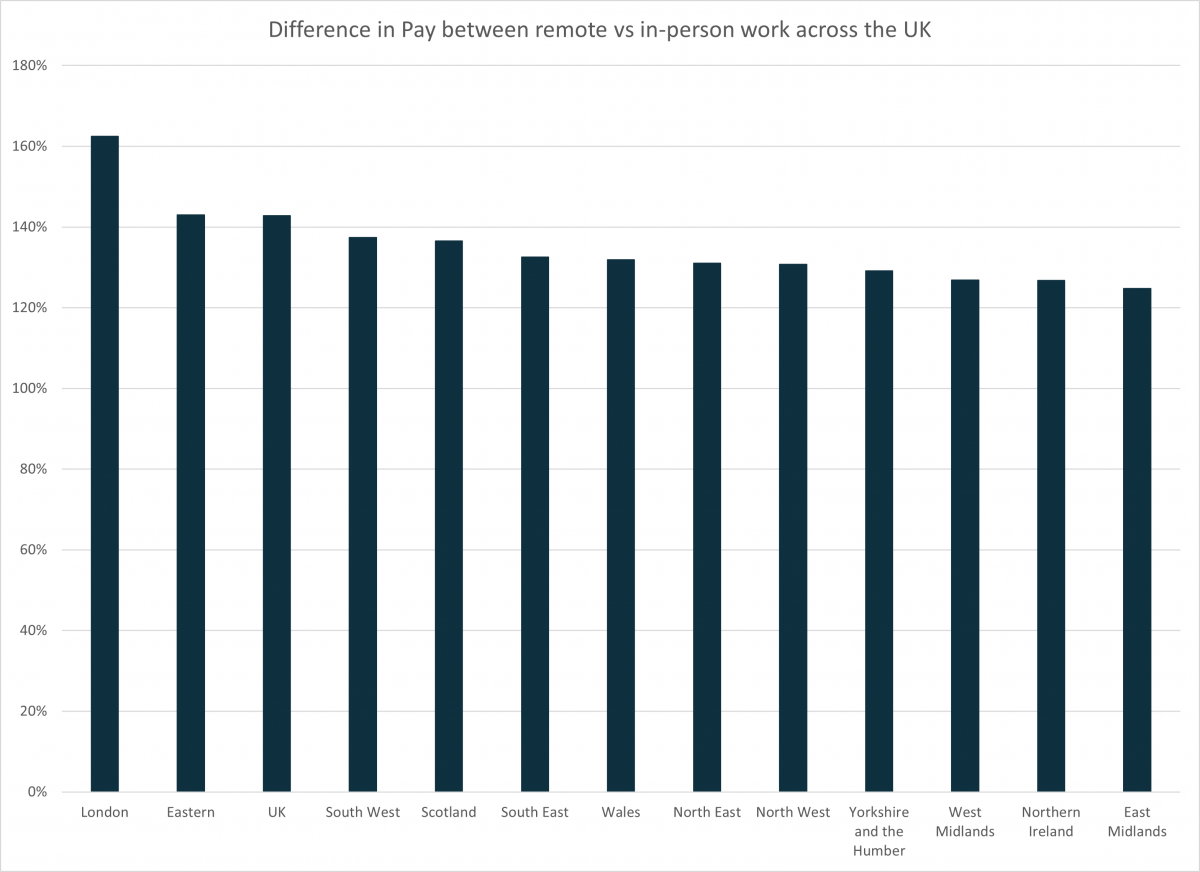
London has the greatest difference between office and remote work. Remote workers in London earn on average 63% more than on-site and office workers. In the East Midlands, pay gaps between remote employees and in-person staff are the least but still significant, with those who work remotely earning 25% more.
UK wide differences in remote vs in-person pay by business sector

UK wide, business sectors where remote workers earn at least 20% more than in-person workers include Manufacturing, Marketing, Legal, IT, Science, Social Care, Facilities Management, the Public Sector, Environmental, Hospitality & Leisure, and Sales.
Manufacturing has the greatest pay difference of 58% between remote vs in-person roles. Customer Services is the only industry where the average office-based work is higher paid than remote work.
Regional differences in remote vs in-person pay by business sector
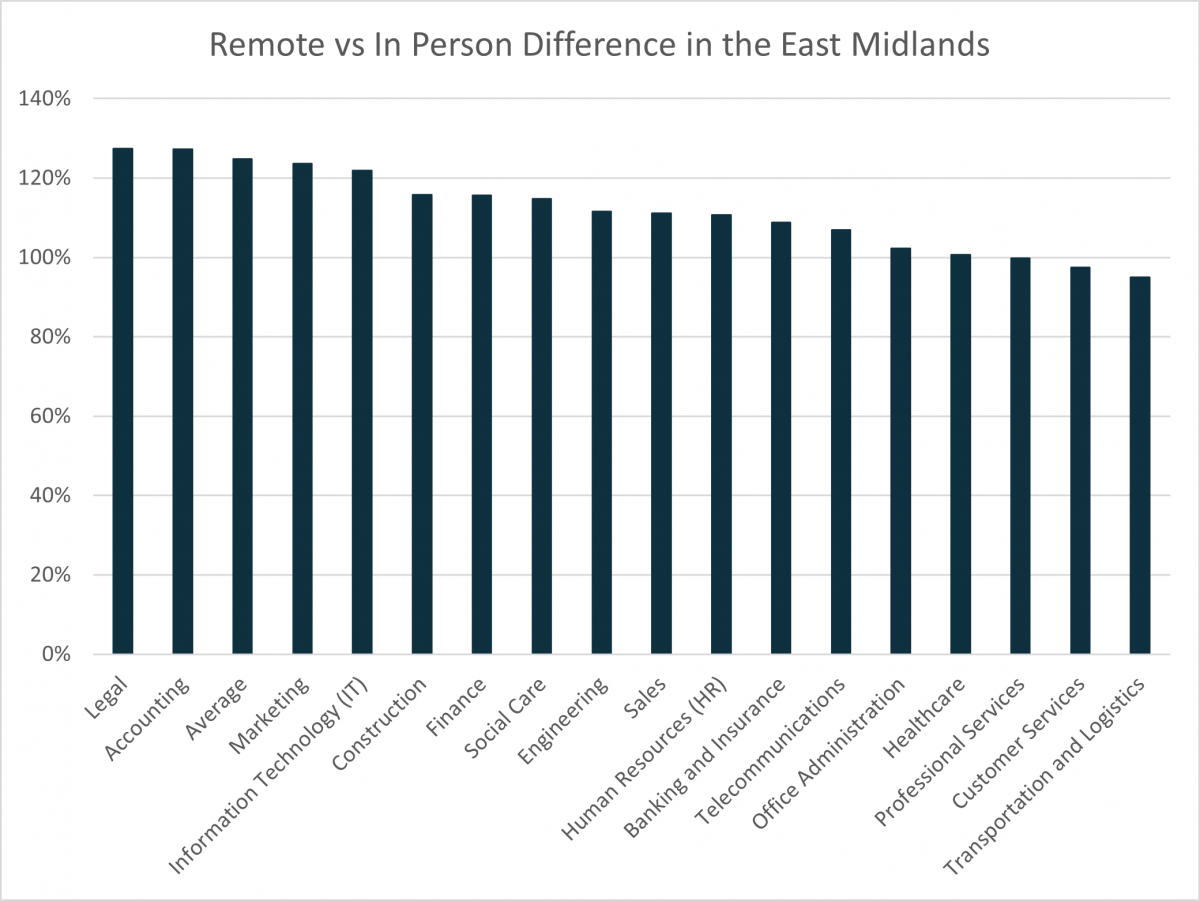
In the East Midlands, higher salaries (20% and above) are enjoyed by remote workers in professions including Legal, Accounting, Marketing, and IT. However, remote professionals in Customer Services and Transportation & Logistics earn less than their office and on-site counterparts.
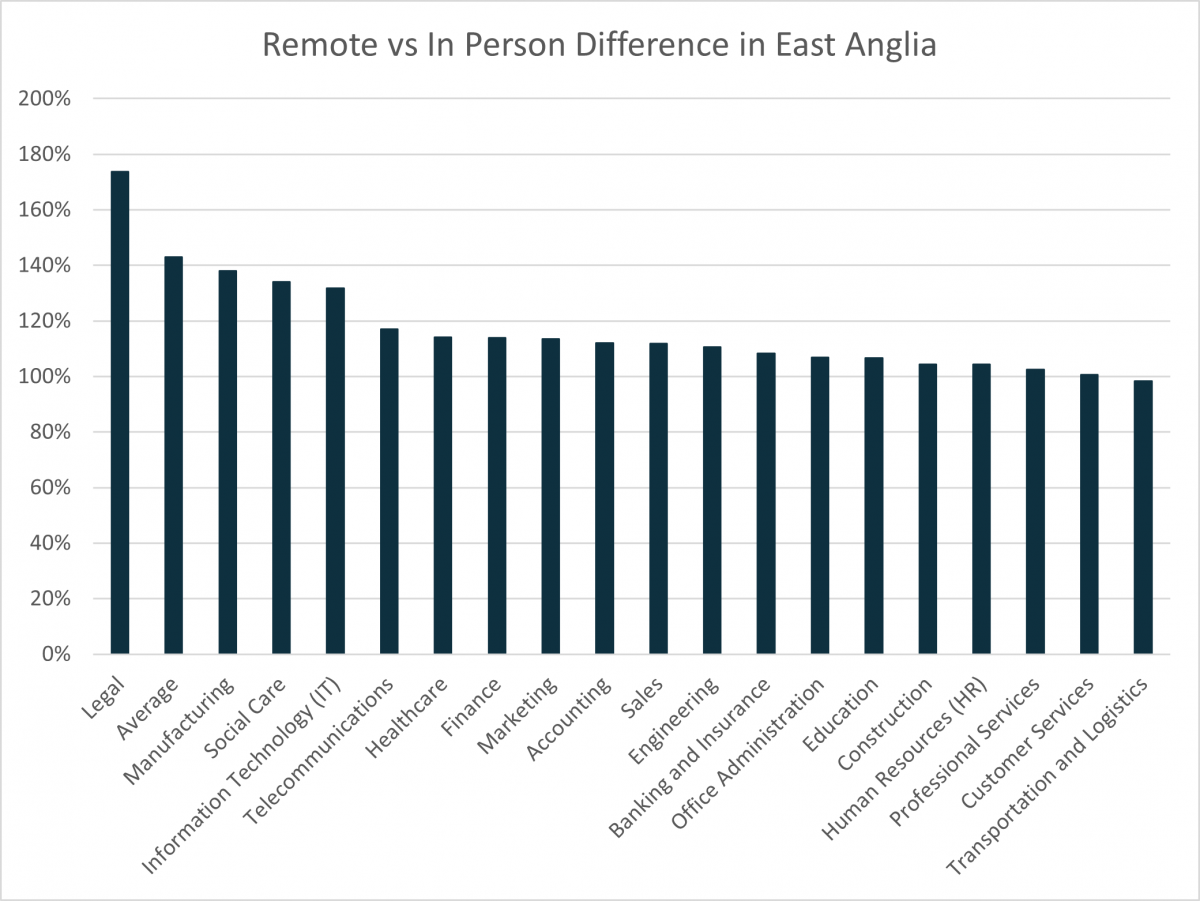
In East Anglia, pay for remote workers in business sectors including Legal, Manufacturing, Social Care, and IT earn at least 20% more than in-person employees. Only remote Transportation and Logistics workers earn less than on-site workers.
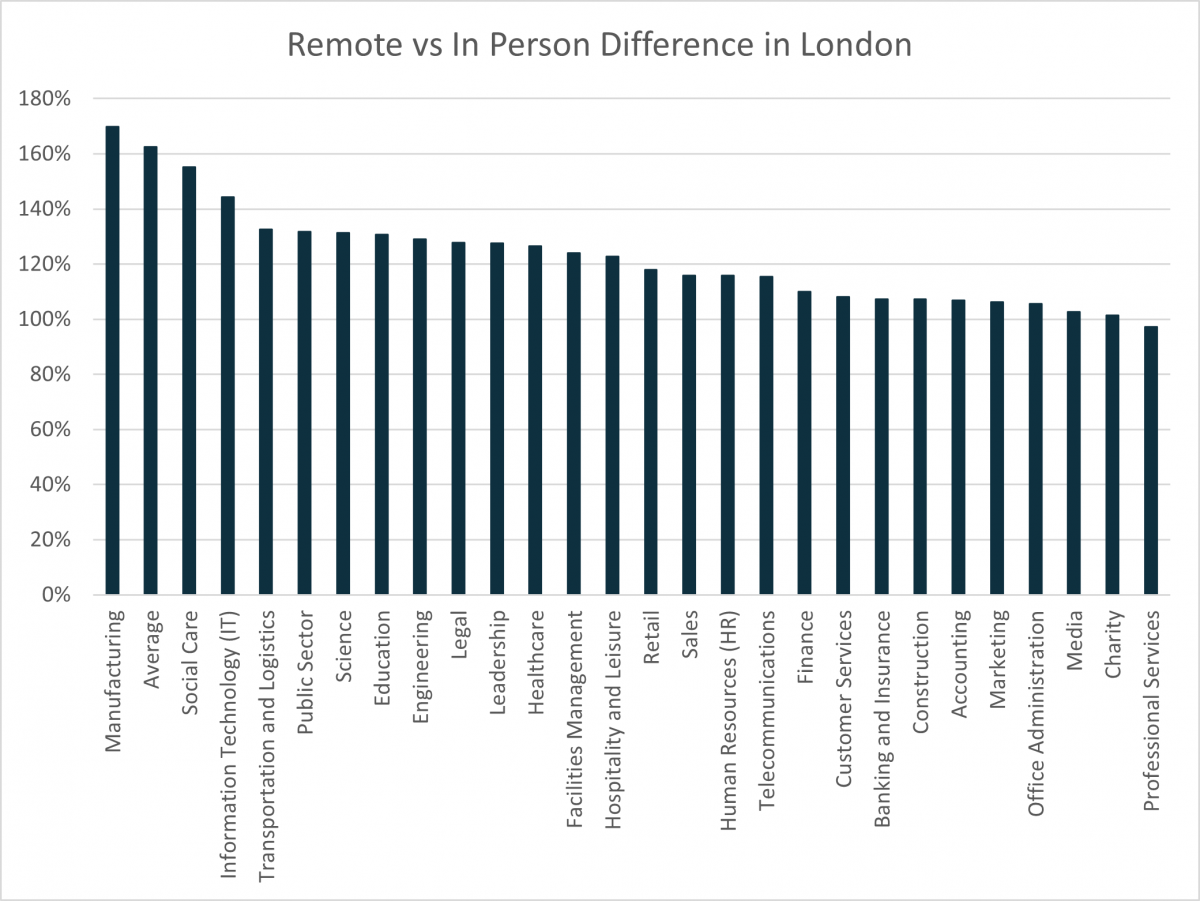
In London, remote workers in Manufacturing and Social Care earn 50% or more than their sector’s in-person workers. Making at least 20% more, were professionals working in IT, Transportation & Logistics, the Public Sector, Science, Education, Engineering, Legal, Leadership, Healthcare, Facilities Management, and Hospitality & Leisure. Only work from home employees in Professional Services earn less than their office counterparts.
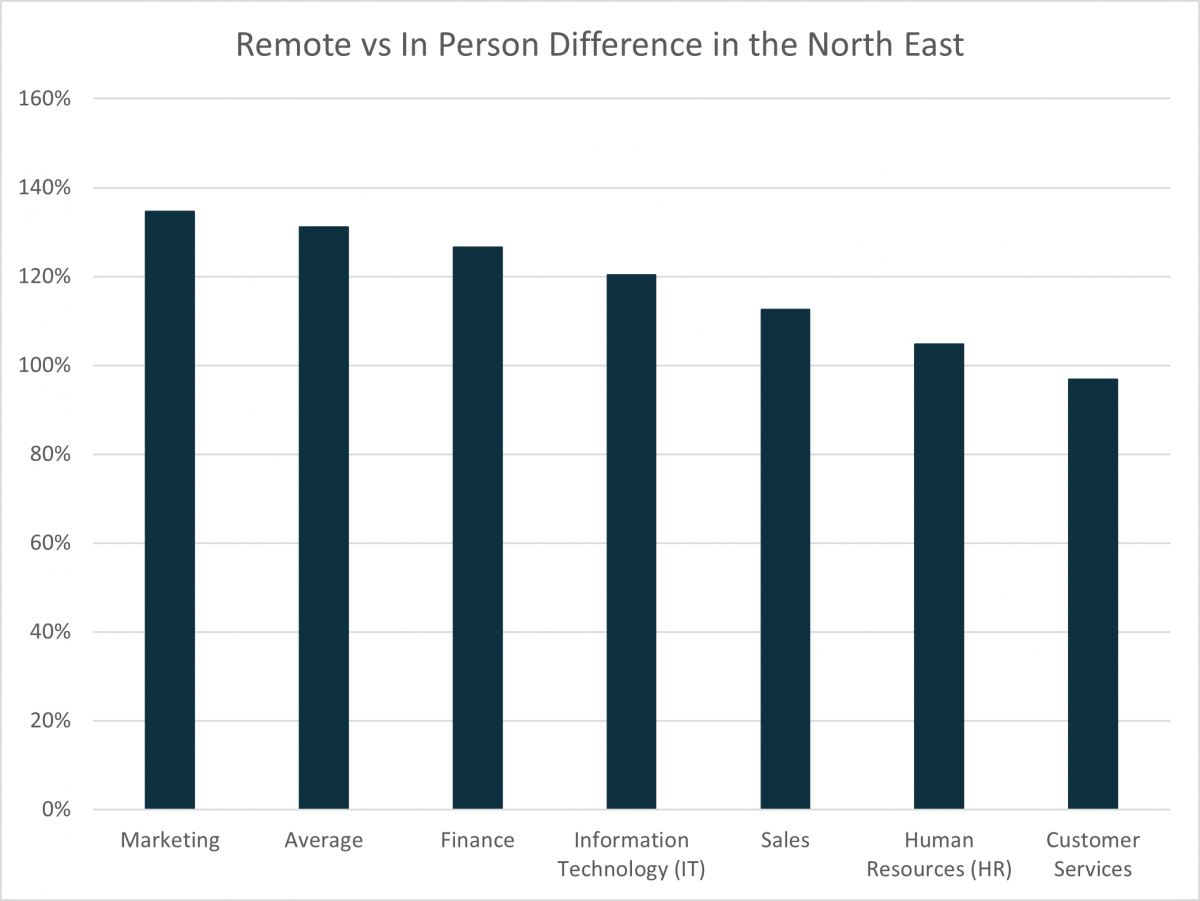
In the North East, remote Marketing and Finance professionals earn at least 20% more than in-person Marketing and Finance workers. In-person Customer Services workers are the only ones to make more than remote employees.
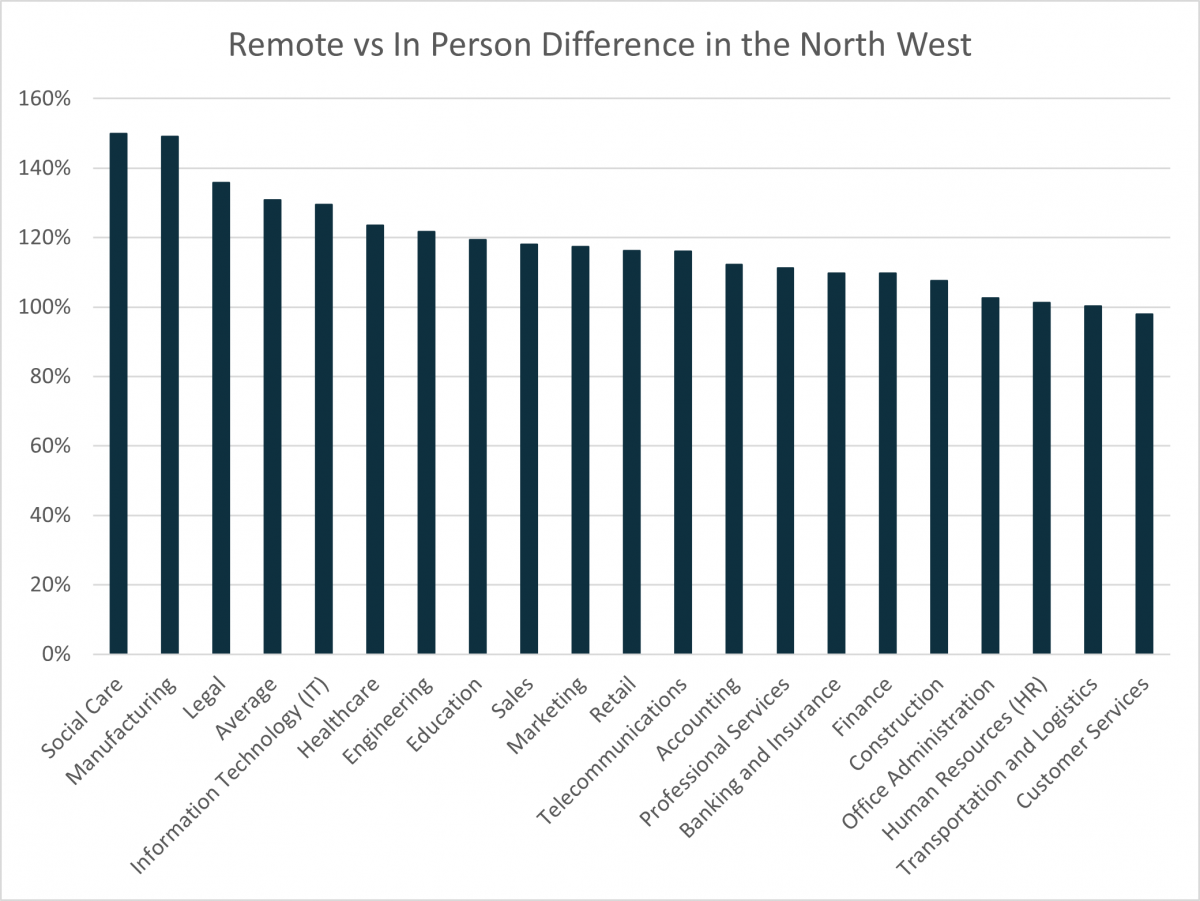
In the North West, Social Care and Manufacturing remote employees earn at least 40% more, and Legal, IT, Healthcare, and Engineering at least 20% more than office workers in the same business sector. Following the trend visible across the country, remote Customer Services staff earn less than in-person equivalents.

In Scotland, remote Marketing employees make 100% more than office Marketing staff, with remote IT, Engineering, and Finance workers earning 20% or more than their in-person equivalents. Only remote sales professionals earn less than on-site sales professionals.
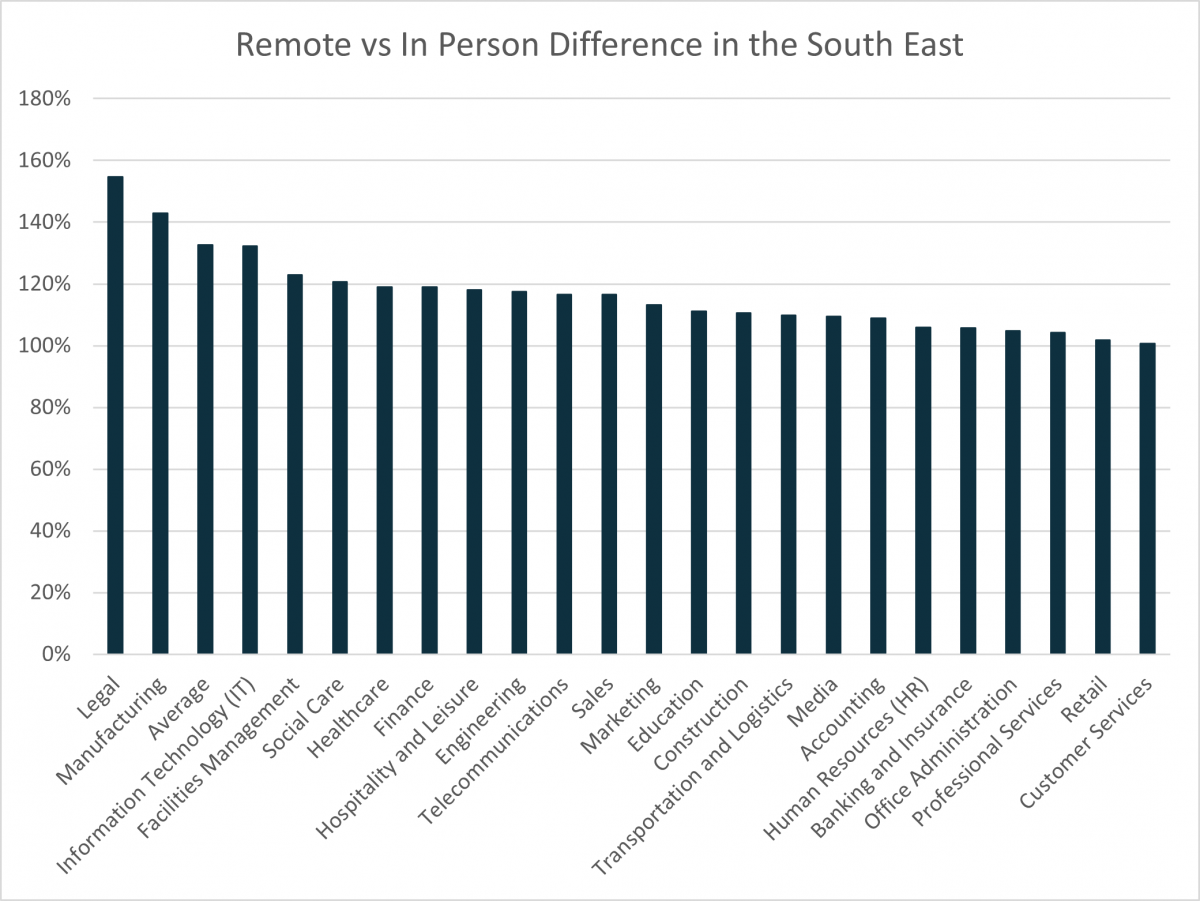
In the South East, earning at least 20% more than office workers are remote staff operating in Legal, Manufacturing, IT, and Facilities Management business sectors.
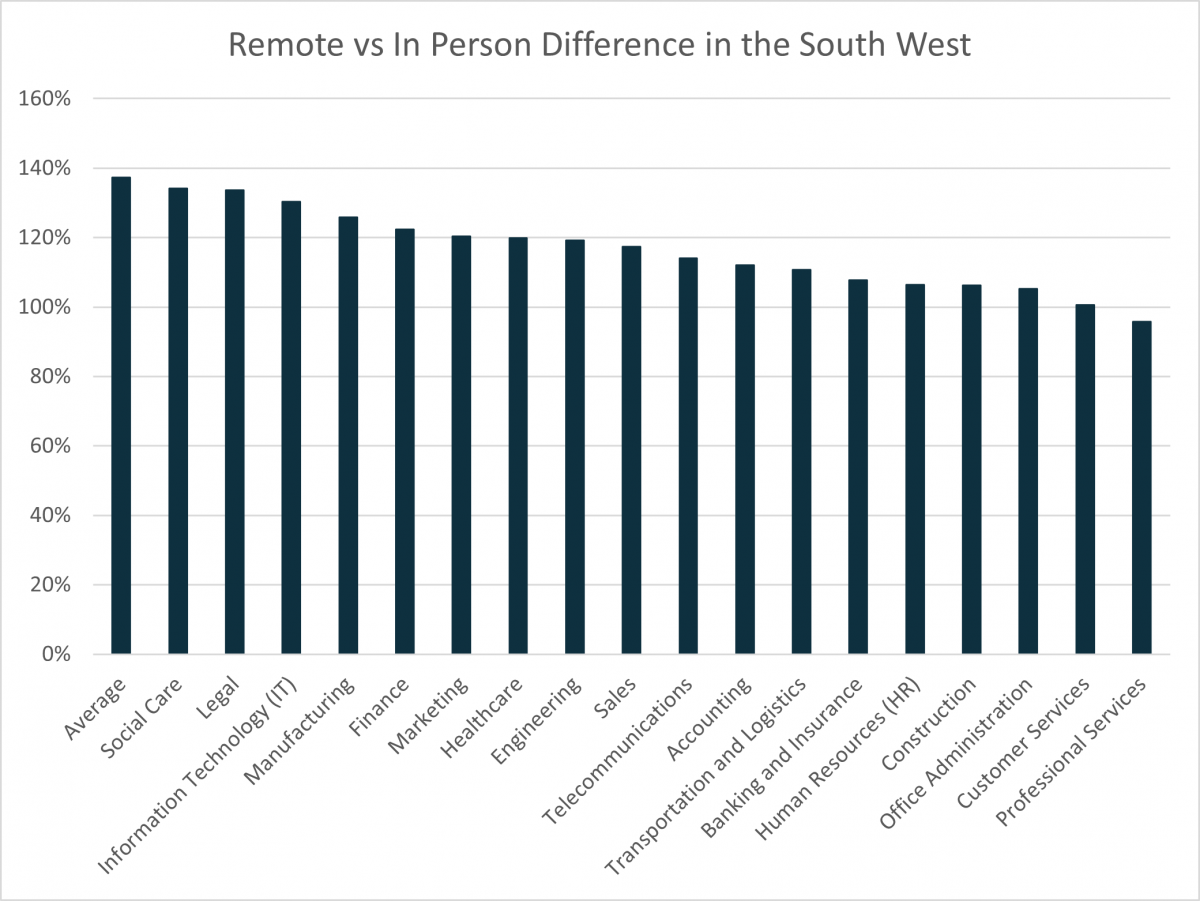
In the South West, home-based Social Care, Legal, IT, Manufacturing, and Finance workers make more than their on-site counterparts. In-person Professional Services workers buck the trend and make more than remote workers in the same sector.
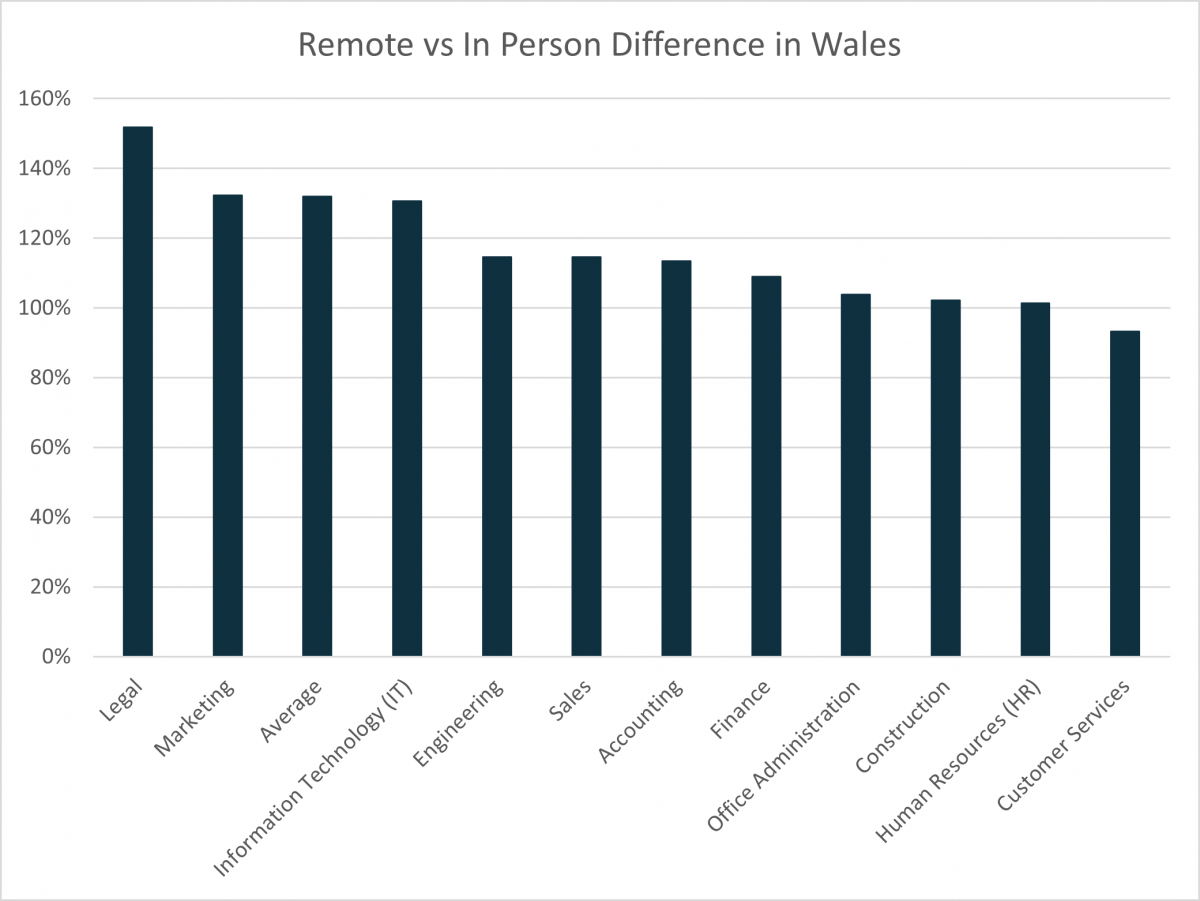
In Wales, pay is at least 20% higher for work from home Legal, Marketing, and IT staff. Only remote Customer Services staff earn less.
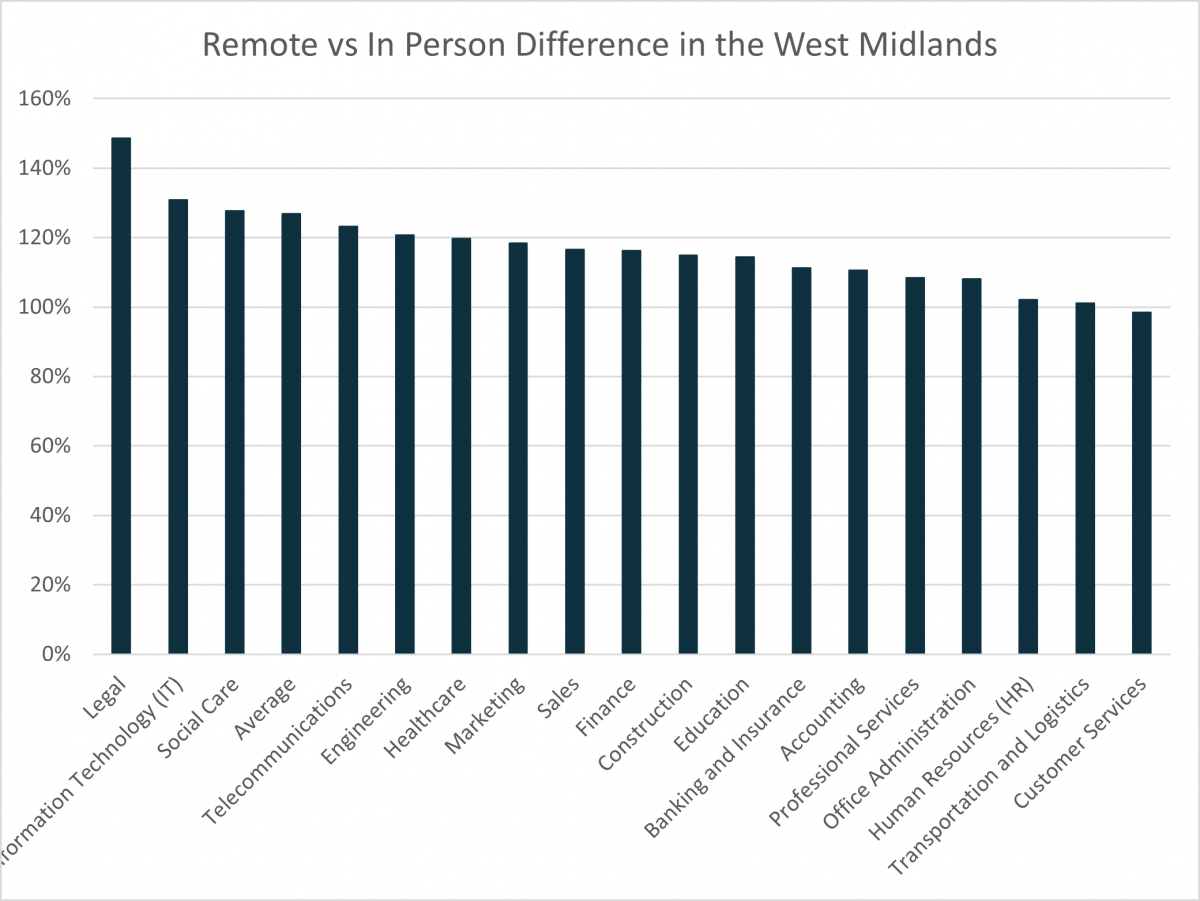
In the West Midlands, five remote professions pay better than in-person professions, including Legal, IT, Social Care, Telecommunications, and Engineering. However, home-based Customer Services workers do not do as well as office-based workers.
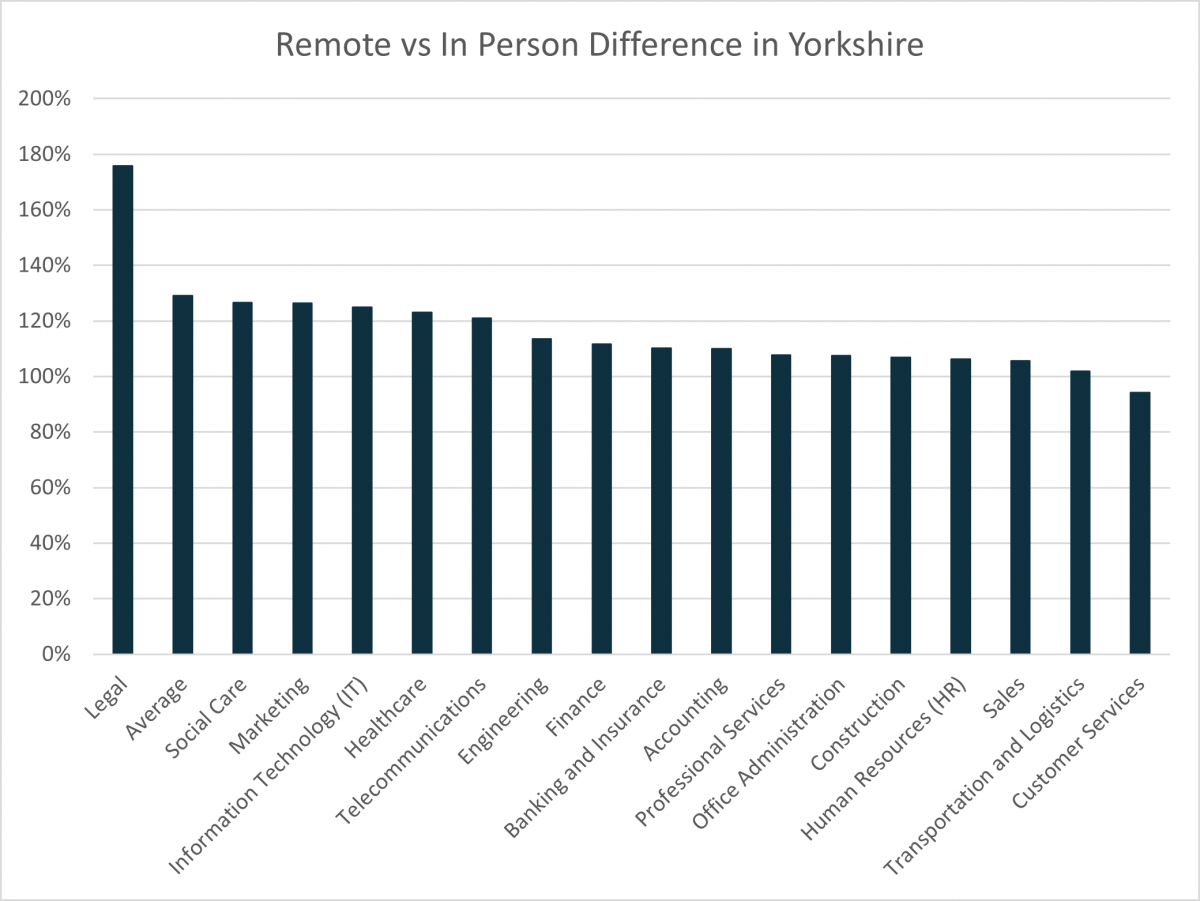
In Yorkshire, remote Legal professionals are earning 60% or more on top of the salary of Legal office workers. Remote Social Care, Marketing, IT, Healthcare, and Telecommunications staff do at least 20% better than in-person workers in the same sector. Once more, home-based Customer Services employees earn less than office-based Customer Services staff.
Greatest and smallest differences in sector/region combinations

The greatest differences in average pay between remote and in-person workers were in the Marketing sector in Scotland, and the Legal sector in Yorkshire.
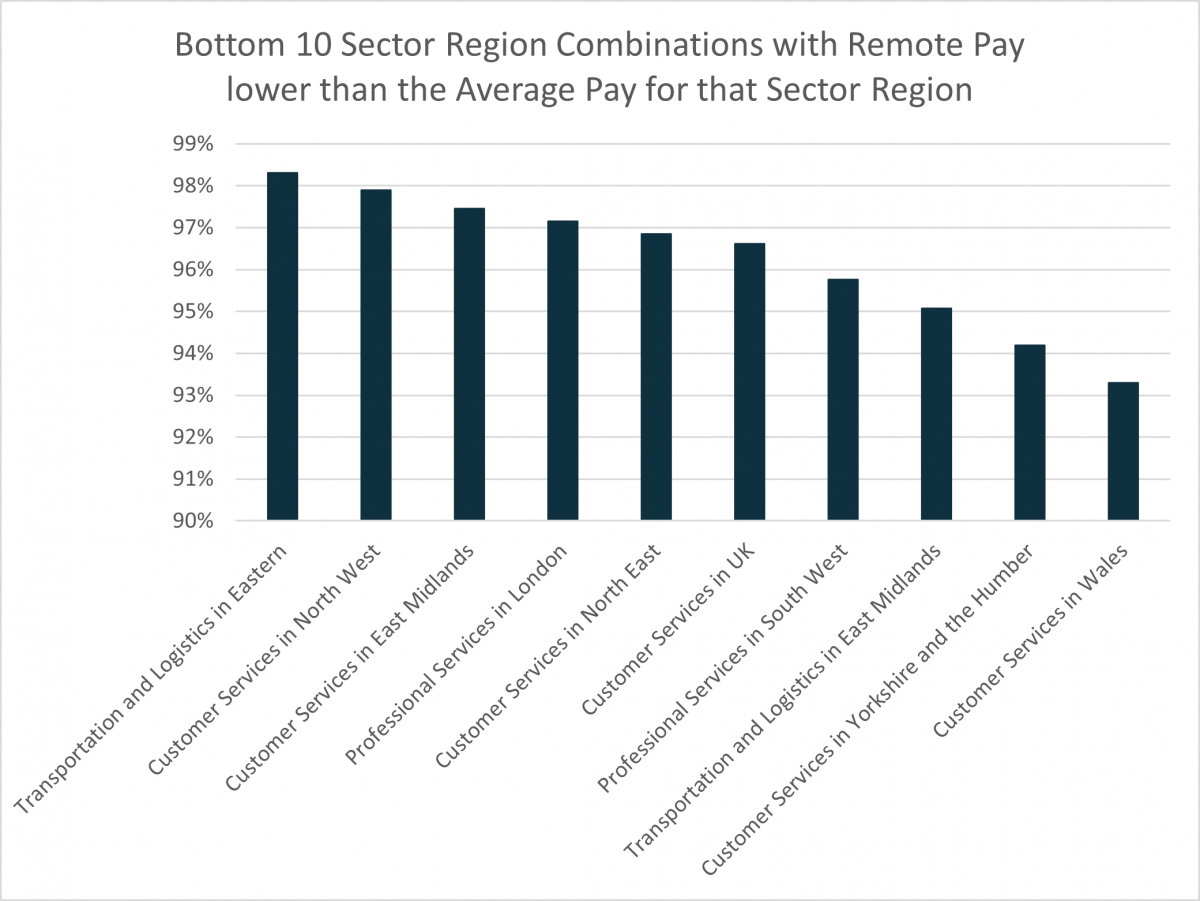
The sector and region combinations where remote workers earn less than in-person workers were in Transportation & Logistics in Eastern regions and Customer Services in the North West.
Average remote pay and office salaries compared to UK average by sector

As expected, Leadership roles have the highest average salary, both in-person and remote. However, many Leadership roles are not advertised, and salary adjustments have not been made to our dataset. After Leadership, the highest average salaries for remote workers are in Marketing, IT, and Professional Services.
Salary difference by region compared with UK average
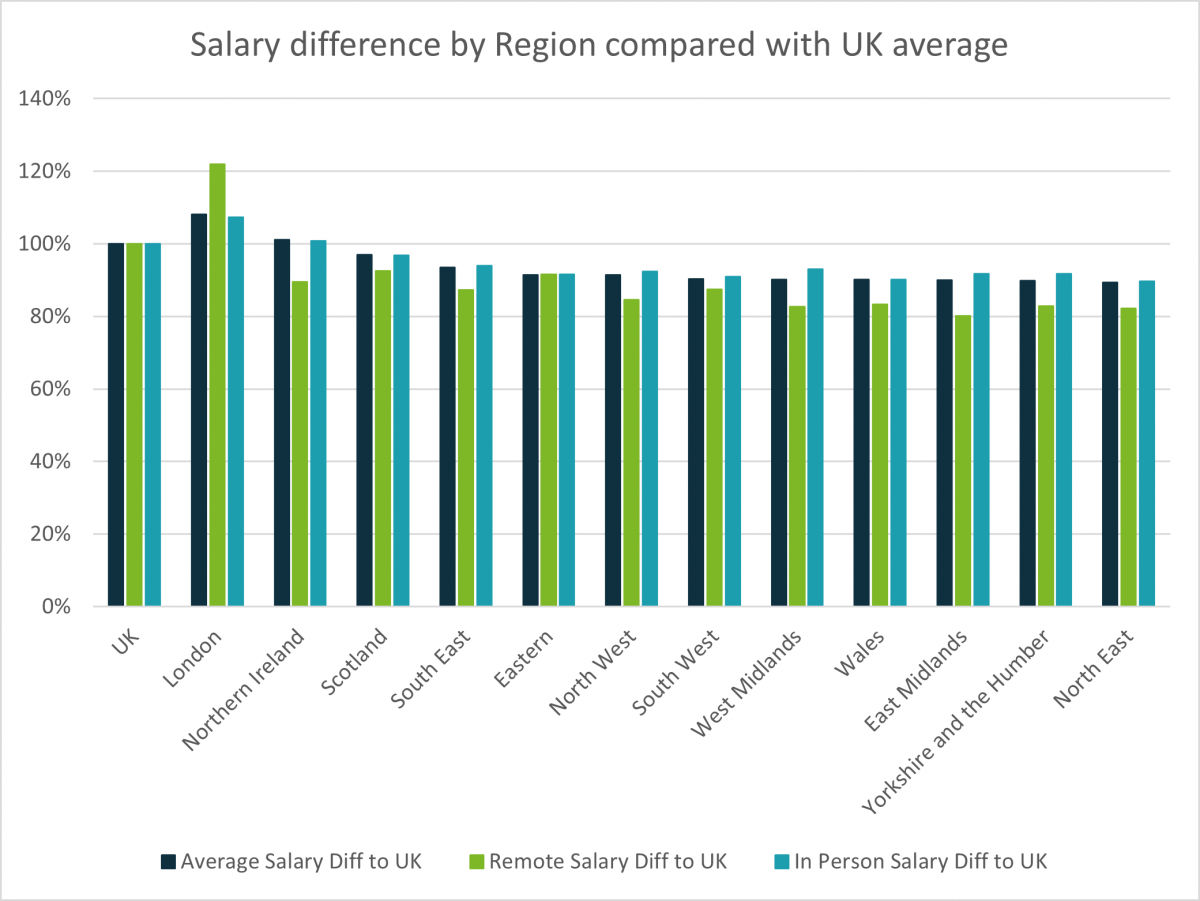
Only London has higher remote pay compared to the UK average. Remote pay outside of London generally has a greater decrease compared with the average decease or in-person decrease; even if there is a decrease, remote work within a sector pays more than the average or in-person average salary
Salary difference by sector compared to UK average
For each business sector, the following graphs compare the regional average salaries to the UK average salary, regional remote salaries to the UK average remote salary, and regional in-person salaries to the UK average in-person salary.
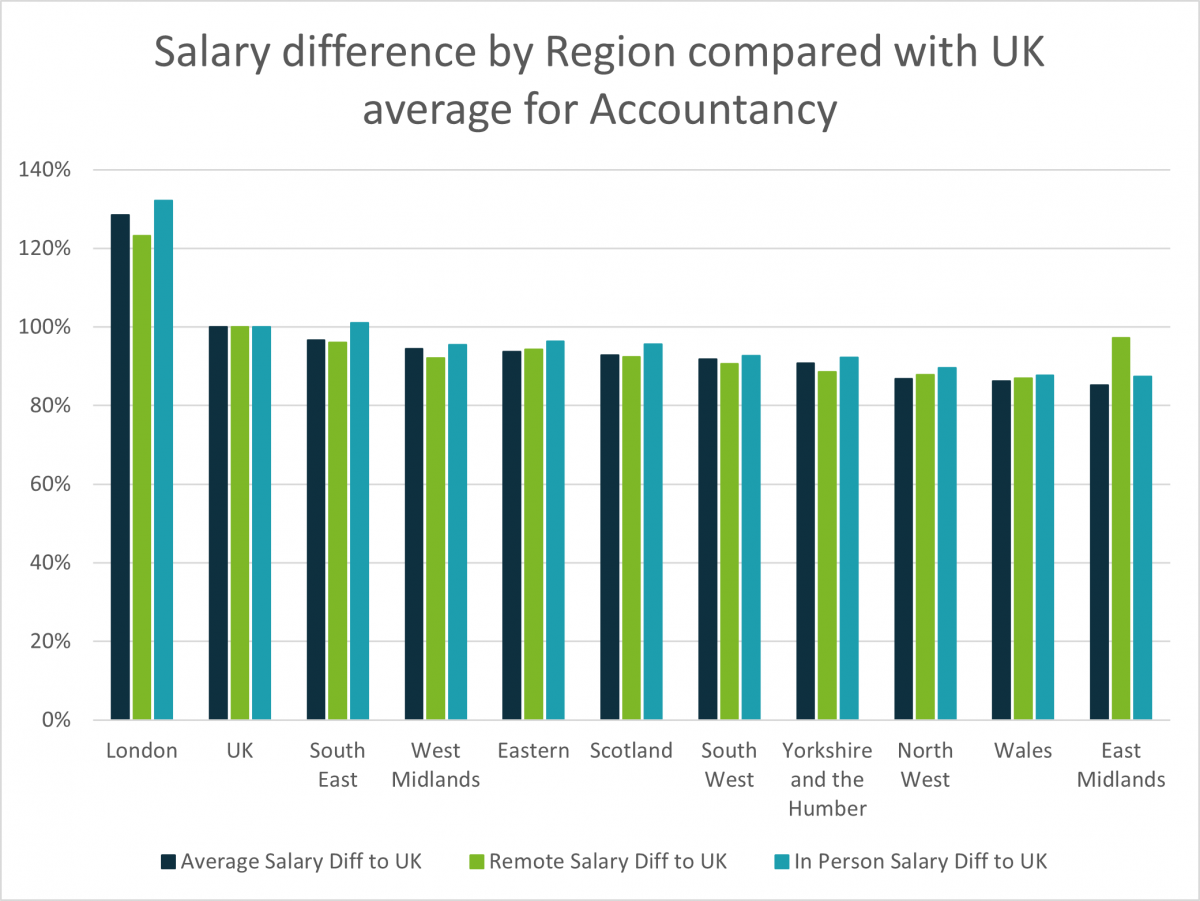
In Accounting, London-based office workers earn 32% more than the UK average office worker, while remote workers earn 23% more than the UK average remote worker. In the South East, office-based Accountancy workers also earn above the average, although by only 1%.
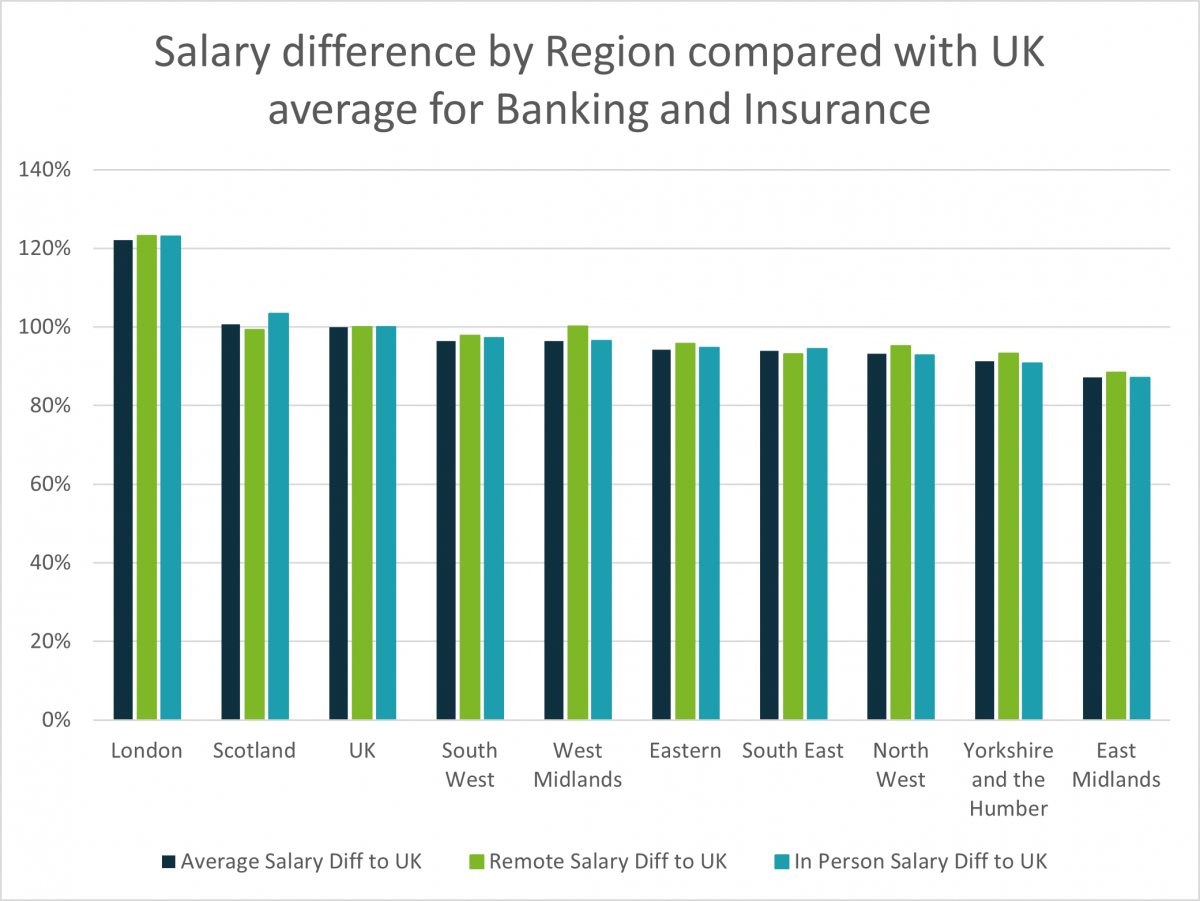
In Banking and Insurance, office and remote-based Londoners earn 23% more than the UK average. Office-based Banking and Insurance staff in Scotland earn 3% more than the average office-based UK average.
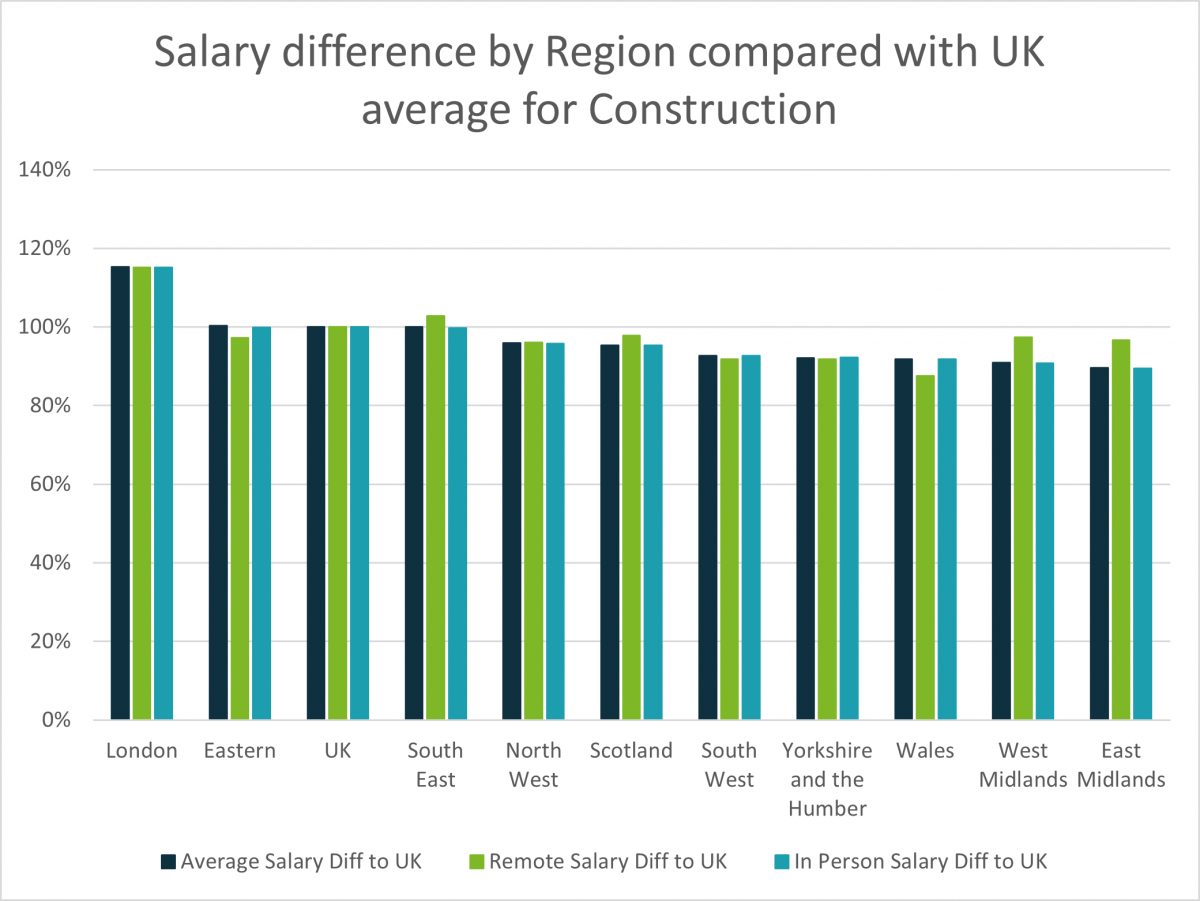
In Construction, London remote and office employees earn 15% more than the UK average for remote and office workers in construction. In the South East, remote workers earn 3% above the UK average.
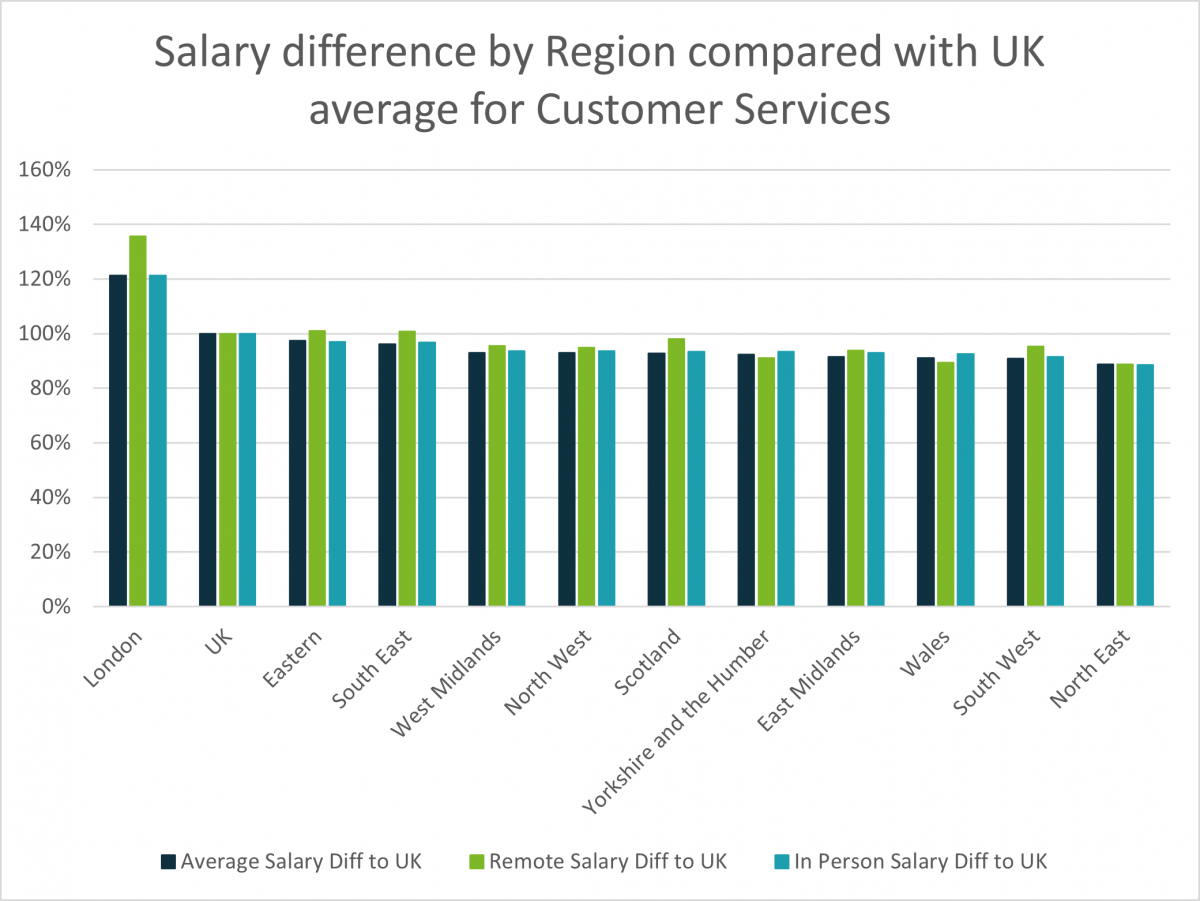
In Customer Services, London-based office staff earn 21% more than the UK average, while remote staff earn 36% more. Eastern and South East remote workers make 1% above the UK average.
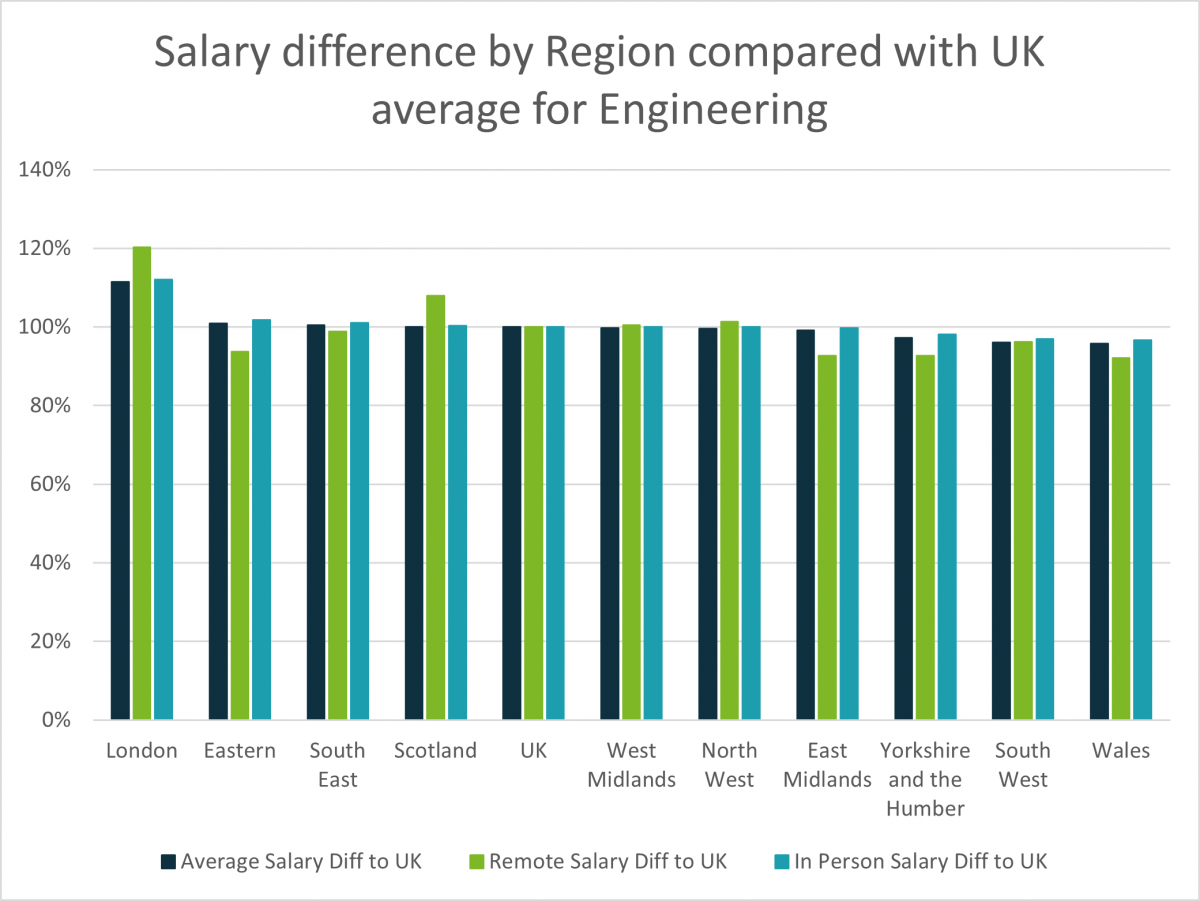
In Engineering, London-located remote employees earn 20% above the UK average, whereas office employees make 12% more. While Scotland's remote workers make 8% more, salaries are very consistent outside of London. Both in-person and remote work pay remain relatively flat across the country, especially when compared to other job sectors.
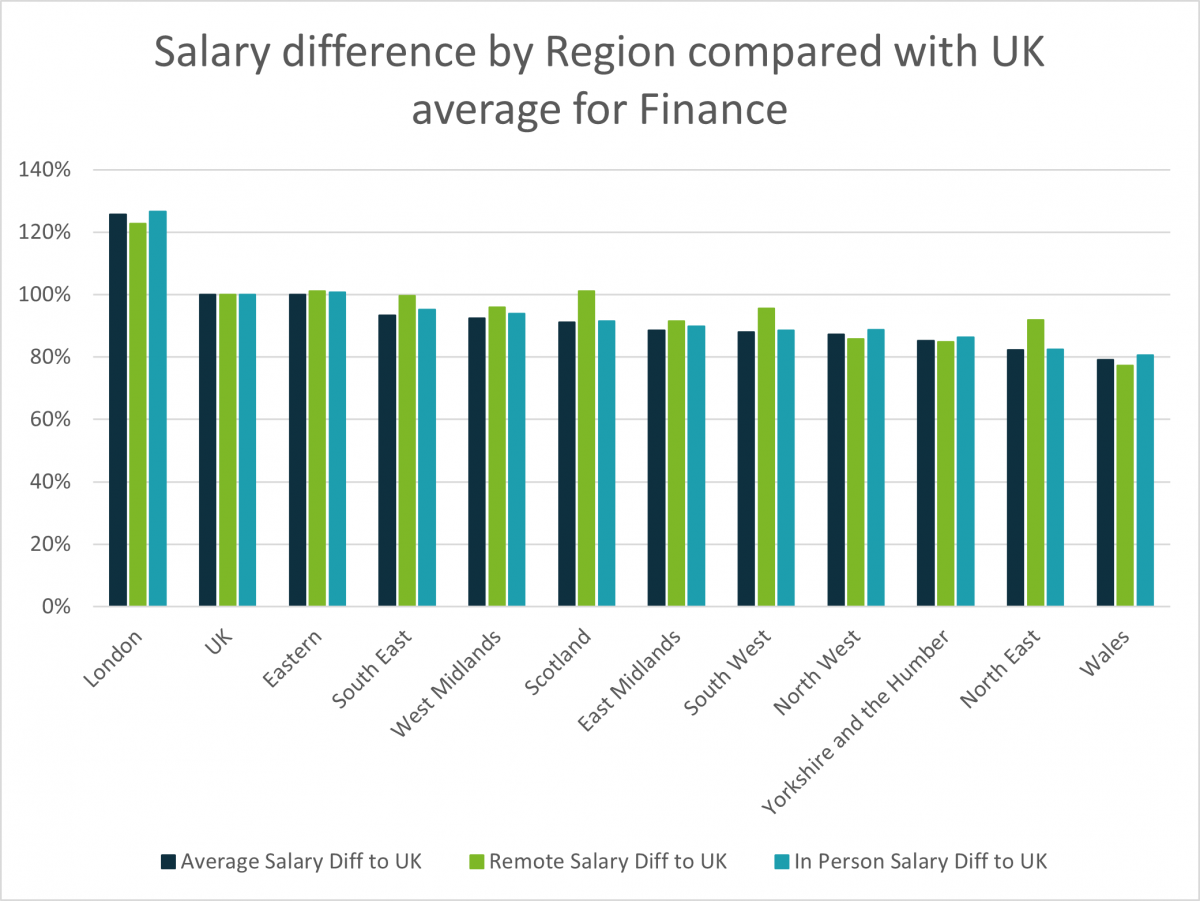
In Finance, London-based remote and office workers earn more than the UK average (23% more and 27% more, respectively). Notably, in Scotland, remote Finance workers attain earnings in line with the national average, whereas in-person workers fall well below, earning only 92% of the UK average.
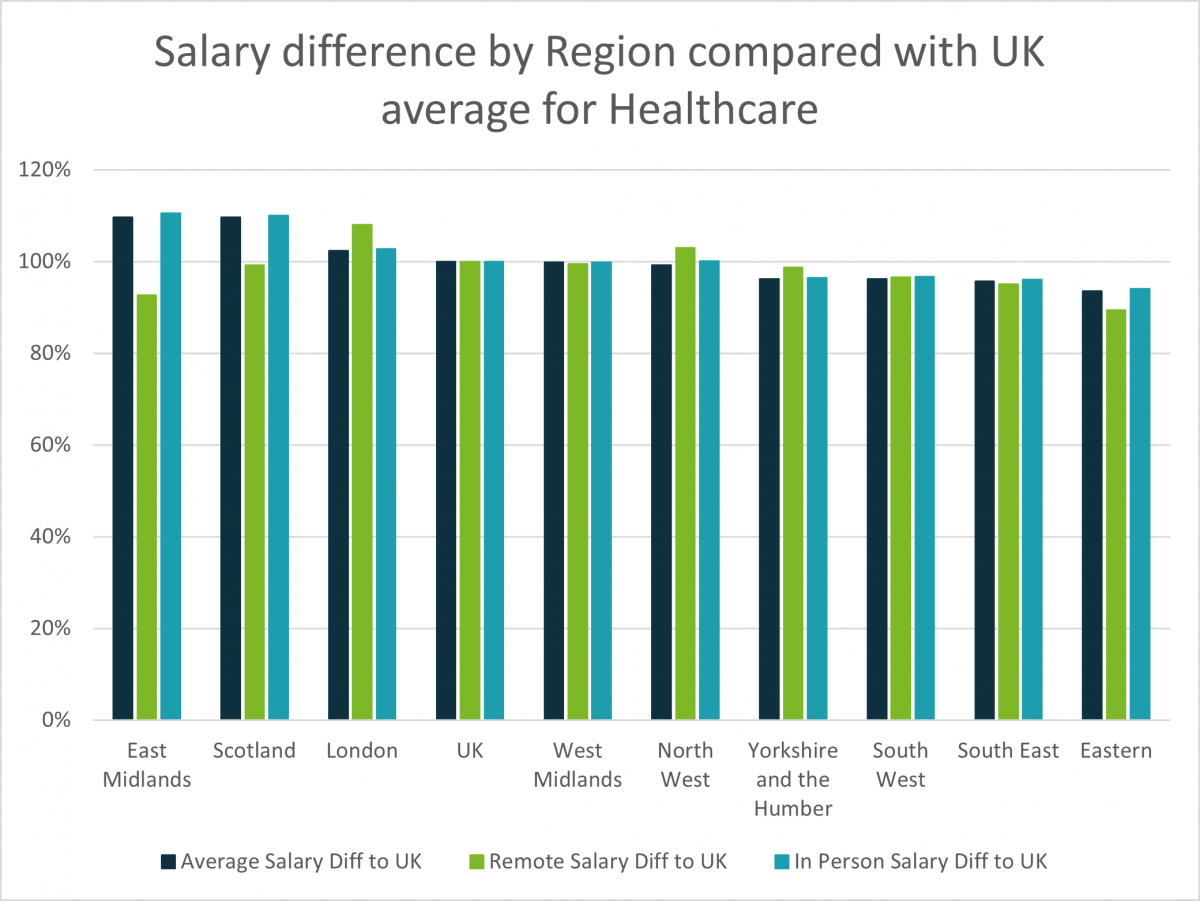
In Healthcare, office-based workers in the East Midlands make 11% more than the national average and 10% more in Scotland. East Midlands and Scotland have higher average salaries compared with London, while South East-based employees earn the second lowest average salary.
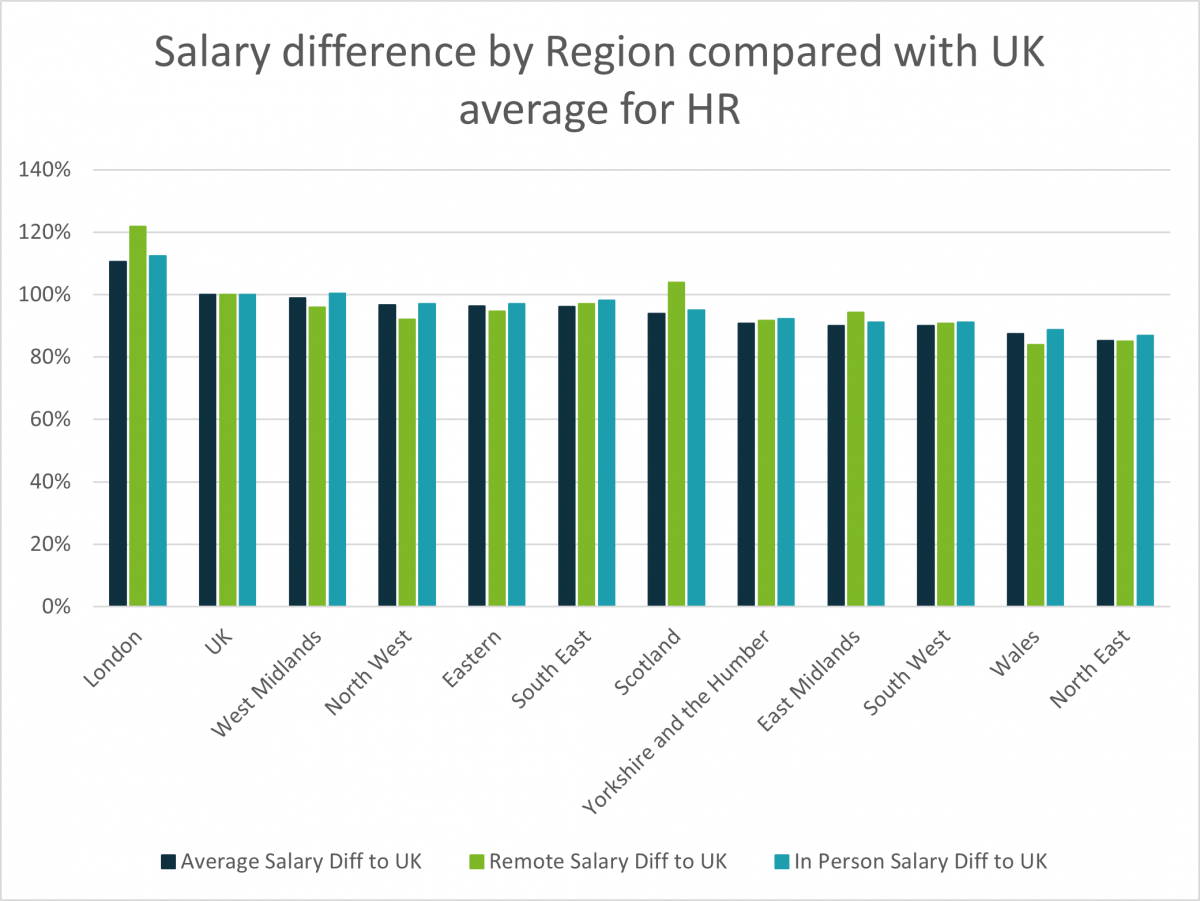
In HR, London remote HR staff earn an average of 22% above the UK average for the HR sector. Their office counterparts lag behind, making 12% above the average. Only remote HR workers in Scotland have a higher salary, 4% above the UK average.
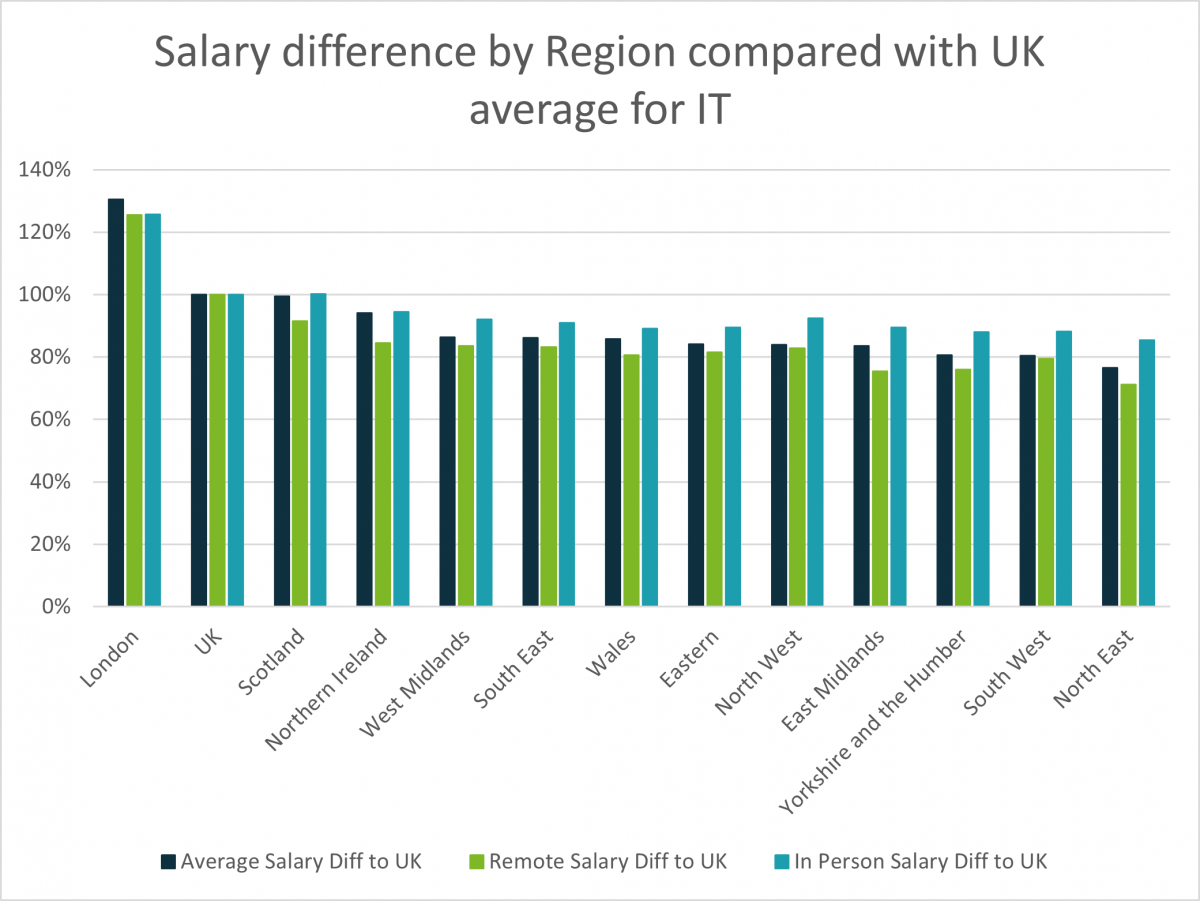
In IT, London leads the way with remote and office workers earning above the UK average for remote and in-person IT professionals (25% and 26%, respectively).

In Legal, remote workers in London, Wales, the South East, Eastern, and Yorkshire and the Humber make more than the UK average Legal remote worker. For office-based Legal workers, salaries in London, Wales, the South West, South East, Eastern, and North West are higher than the average.

In Marketing, remote salaries are high than the remote average in Scotland. In-person, only London Marketing roles pay a higher than average wage.
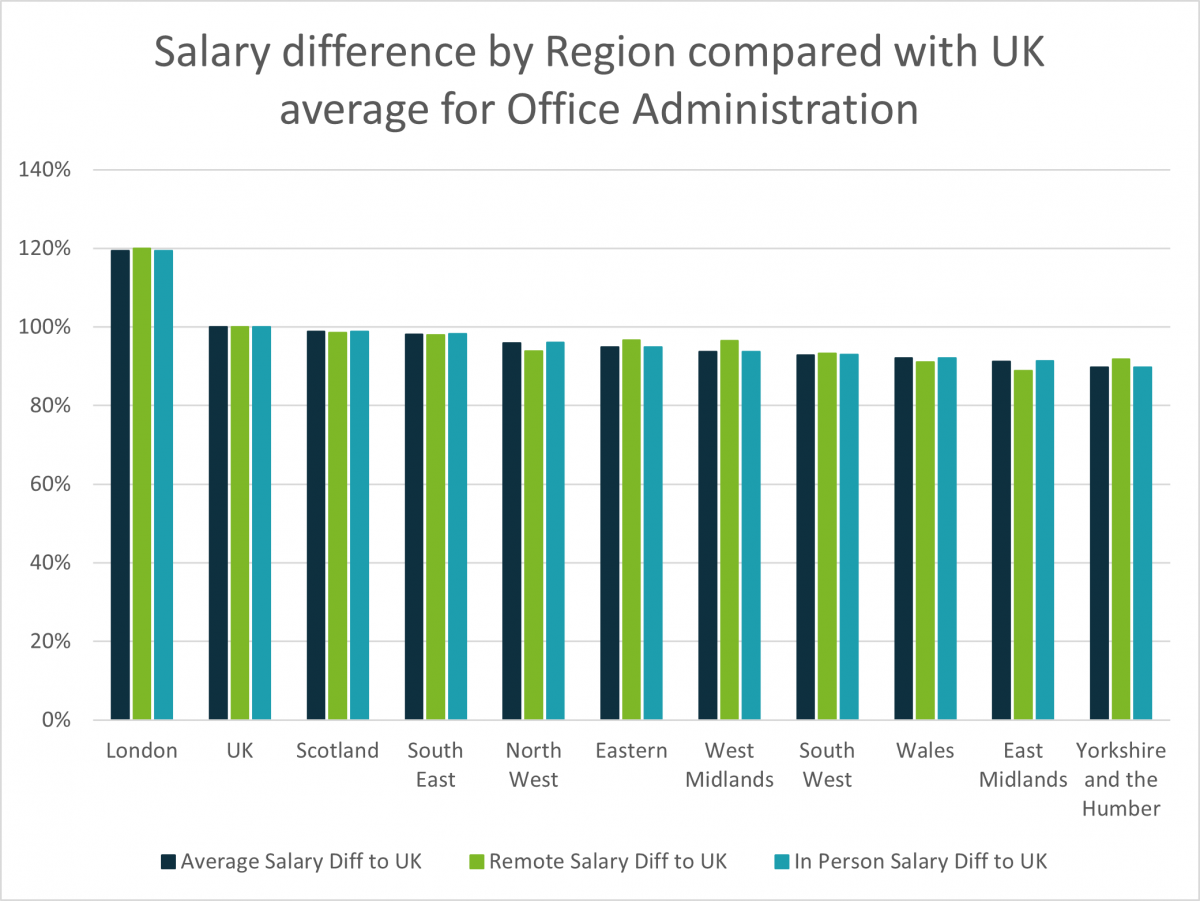
In Office Administration, remote staff and in-person staff earn a higher than average salary (20% and 19%, respectively).
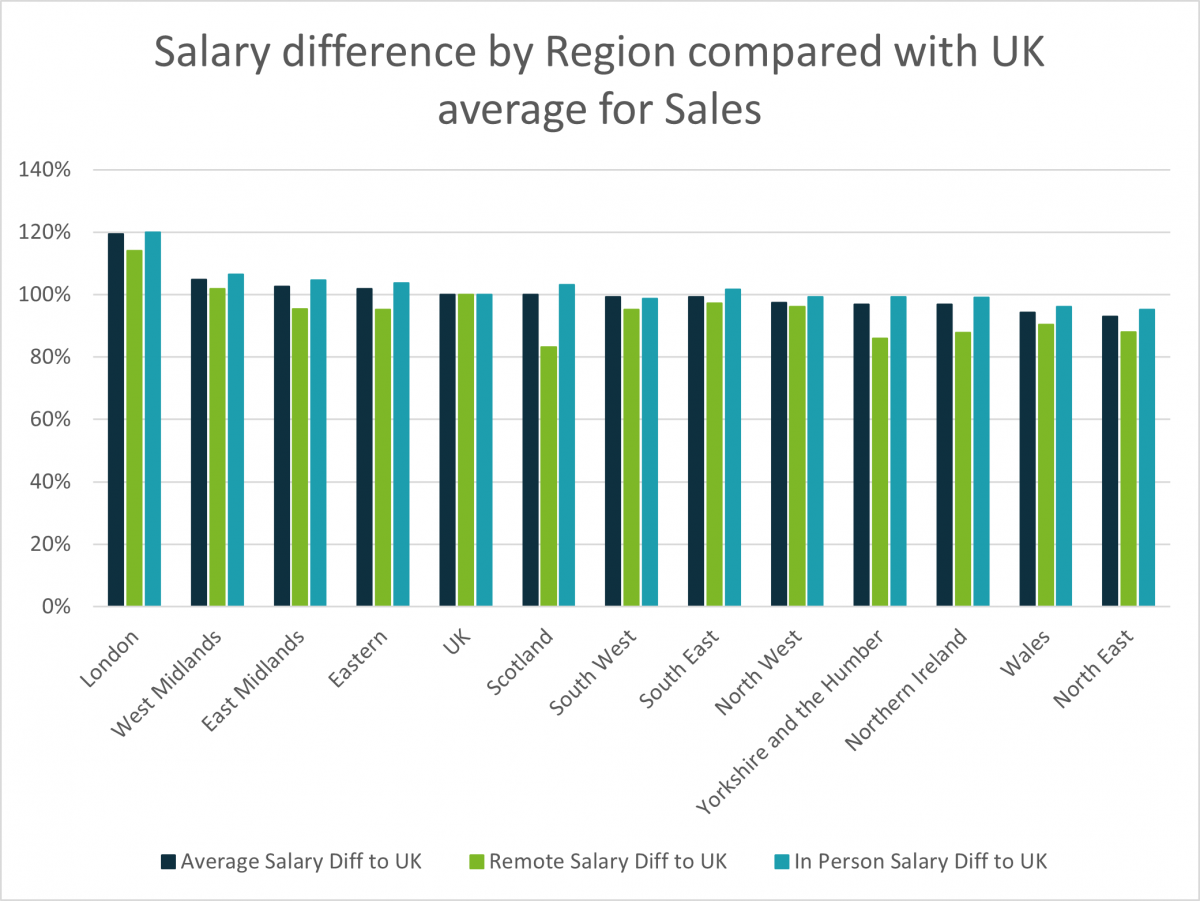
In Sales, London remote pay is 14% higher and office 20% higher than the UK average for remote and in-person workers. Salaries in the West Midlands are also marginally above the UK average.
